All photos by Anne C. Savage, special to Eclectablog
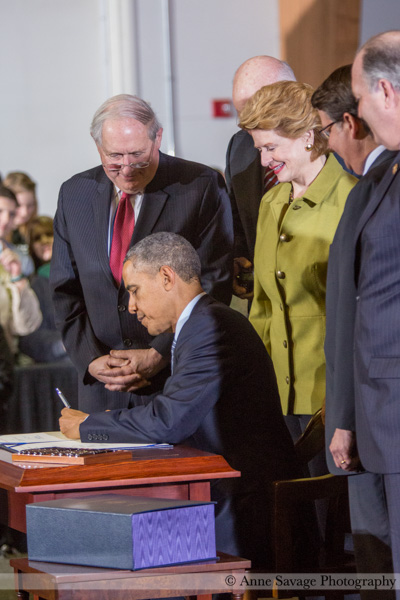 President Barack Obama traveled to East Lansing, Michigan yesterday to sign the federal farm bill into law. Last updated in 2008, the bill in its current form has been worked on for four years. Much of the wrangling was contentious and no topic was as contentious as its impact on the Supplemental Nutrition Assistance Program (SNAP), commonly called food stamps. Republicans in Congress wanted to slash this essential program by $40 billion at a time when our national economy is still in recovery mode. Fortunately Democrats were able to reduce the Republican hit on SNAP benefits by a full 80%, a 1% cut overall. Nearly 80% of the spending in this nearly $1 trillion bill is for SNAP.
President Barack Obama traveled to East Lansing, Michigan yesterday to sign the federal farm bill into law. Last updated in 2008, the bill in its current form has been worked on for four years. Much of the wrangling was contentious and no topic was as contentious as its impact on the Supplemental Nutrition Assistance Program (SNAP), commonly called food stamps. Republicans in Congress wanted to slash this essential program by $40 billion at a time when our national economy is still in recovery mode. Fortunately Democrats were able to reduce the Republican hit on SNAP benefits by a full 80%, a 1% cut overall. Nearly 80% of the spending in this nearly $1 trillion bill is for SNAP.
President Obama pointed to Michigan as a bellwether for the country and gave kudos to gubernatorial candidate Mark Schauer and Senate candidate Gary Peters for their role in helping bring the automotive industry back from the bring. “The American auto industry has always been the heartbeat of the Michigan economy and the heart of American manufacturing,” President Obama said. “So when that heartbeat was flat-lining, we all pulled together, all of us — autoworkers who punched in on the line, management who made tough decisions to restructure, elected officials like Gary Peters and Mark Schauer, folks who believed that rescuing America’s most iconic industry was the right thing to do.”

Democratic gubernatorial candidate and former Congressman Mark Schauer with Sen. Carl Levin

Congressman and U.S. Senate candidate Gary Peters
The fact that a bill this big and this sweeping is almost unimaginable in this Congress. Much of the credit goes to Senate agriculture committee chair Debbie Stabenow from Michigan. It is widely accepted that, without her dogged determination over the past four years, this bill would not have been signed yesterday. It’s impact on Michigan is huge.
“We like to say Michigan is on every page of this farm bill,” said Jim Byrum, president of the Michigan Agri-Business Association.He gives his organization and others like it some of the credit for that and much of the rest to Sen. Debbie Stabenow. As chair of the Senate agriculture committee, the Michigan senator shepherded the bill through Congress, going so far as to lobby for the compromise on the House floor.
“I’ve been doing this a long time,” Byrum said, “and I’m pretty convinced that if Debbie Stabenow hadn’t been chair of the Senate ag committee and had the tenacity and commitment that she did, I don’t think we’d have had a farm bill this year.”
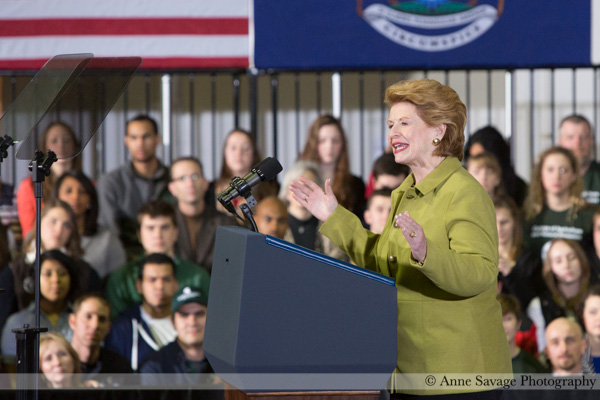
Michigan Senator Debbie Stabenow speaks about the bill she shepherded through the Senate
President Obama was effusive in his praise of Sen. Stabenow, as well, calling her efforts “extraordinary”. “I could not be prouder of our leaders who are here today,” he said. “I could not be prouder of your own Debbie Stabenow, who has done just extraordinary work. We all love Debbie for a lot of reasons. She’s been a huge champion of American manufacturing but really shepherded through this farm bill, which was a very challenging piece of business. She worked with Republican Senator Thad Cochran, who I think was very constructive in this process. We had Representatives Frank Lucas, a Republican, working with Collin Peterson, a Democrat.”

Michigan Senator Debbie Stabenow
Senator Stabenow’s grandson was there to celebrate his grandma’s big achievement along with members of House and Senate and a wide array of Michigan Democrats.

Michigan Senator Debbie Stabenow’s grandson

Rep. Jim Ananich, Brian Kandler, Senate Minority Leader Gretchen Whitmer, Flint Mayor Dayne Walling, and MDP Chair Lon Johnson

Ohio Congresswoman Marcia Fudge

Lansing Mayor Virg Bernero
While he was in town, President Obama met with Detroit Mayor Mike Duggan. According to the White House, the two were joined by White House Senior Adviser Valerie Jarrett and Don Graves, Senior Adviser at the National Economic Council and discussed the situation in Detroit and the efforts underway to “work to break down barriers and direct existing resources to support local priorities that bring jobs, innovation and opportunity into the City.”

Detroit Mayor Mike Duggan
The White House readout on their meeting continued:
They also discussed creating ladders of opportunity for residents of Detroit; pathways to help residents get quality healthcare, good paying jobs and to try new approaches to growing businesses and creating economic opportunity. The President reiterated his administration’s long-term commitment to partnering with the Mayor and local leaders to support the economic revitalization of Detroit, so that this iconic American city remains strong and vibrant.
This bill has some major new initiatives that will help farmers, foster stability in agricultural markets, and create jobs.
 Here’s President Obama: “Despite its name, the farm bill is not just about helping farmers. Secretary Vilsack calls it a jobs bill, an innovation bill, an infrastructure bill, a research bill, a conservation bill. It’s like a Swiss Army knife. It’s like Mike Trout — for those of you who know baseball. It’s somebody who’s got a lot of tools. It multitasks. It’s creating more good jobs, gives more Americans a shot at opportunity.”
Here’s President Obama: “Despite its name, the farm bill is not just about helping farmers. Secretary Vilsack calls it a jobs bill, an innovation bill, an infrastructure bill, a research bill, a conservation bill. It’s like a Swiss Army knife. It’s like Mike Trout — for those of you who know baseball. It’s somebody who’s got a lot of tools. It multitasks. It’s creating more good jobs, gives more Americans a shot at opportunity.”
There are two ways the new law does this, the President told the audience: by supporting rural communities and “help[ing] make sure America’s children don’t go hungry. “My position has always been that any farm bill I sign must include protections for vulnerable Americans, and thanks to the good work of Debbie and others, this bill does that,” he said. “And by giving Americans more bang for their buck at places like farmers markets, we’re making it easier for working families to eat healthy foods and we’re supporting farmers like Ben who make their living growing it. So it’s creating new markets for produce farmers, and it means that people have a chance to directly buy from their farmers the kind of food that’s going to keep them healthy.”
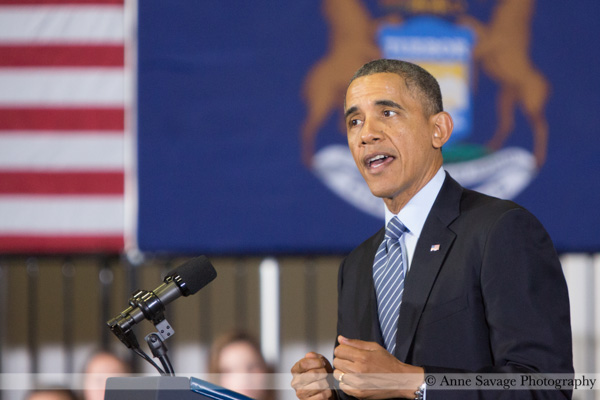
President Obama acknowledged that it’s an imperfect bill. Without naming the cuts to food stamps explicitly, he downplayed the impact while lauding the improbable bipartisan effort that allowed the bill to pass the Republican-led Congress in a form that was acceptable to most Democrats. “It doesn’t include everything that I’d like to see,” President Obama said. “And I know leaders on both sides of the aisle feel the same way. But it’s a good sign that Democrats and Republicans in Congress were able to come through with this bill, break the cycle of short-sighted, crisis-driven partisan decision-making, and actually get this stuff done. That’s a good sign.”

The $8 billion cut to SNAP is due to the closing of what many see as a loophole, one that Michigan uses. So, although Michigan will benefit from many aspects of the new law, the negative impact of the cut will be felt more acutely here than in other states, as well, a hard hit for a state with the 4th highest unemployment rate in the country. The Detroit Free Press explains how the cuts are coming about quite well:
One of the most criticized provision of the bill are the cuts to what are sometimes known as “heat and eat” policies that some states use to expand eligibility for the Supplemental Nutrition Assistance Program, better known as food stamps.Heat and eat works like this: If a household receives benefits under the Low Income Home Energy Assistance Program, the federal government assumes that household is paying for utilities and allows residents to use a standard utility allowance in computing their food assistance eligibility.
Michigan and other states have begun giving out nominal utility assistance payments, as little as a dollar a month, in order to allow some residents to claim the standard allowance and increase their eligibility for food assistance even when utilities are included in their rent.
The farm bill would require residents to get at least $20 a year in utility assistance to be eligible. The Congressional Budget Office estimates that will reduce benefits for 850,000 households nationwide by an average of $90 a month.
How that would be felt in Michigan is unclear, but a report from the Congressional Research Service found that Michigan had 651,795 households that qualified for food stamps through the home energy assistance program in 2011, second only to Pennsylvania. Some of those undoubtedly do pay for utilities separately and would maintain the same level of eligibility.

The Presidential pens, ready for the bill signing
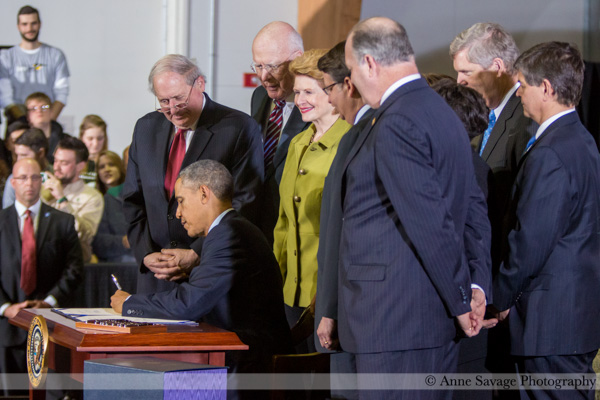
l-r, Senator Carl Levin, President Barack Obama (seated), Vermont Senator Patrick J. Leahy, Senator Debbie Stabenow, Michigan Congressmen Gary Peters and Dan Kildee, Ohio Congresswoman Marcia Fudge, and Sec. Vilsack
Here are some other elements of the new law:
- Expanded support for farmers through crop insurance that helps protect them in bad years.
- Increased investments in specialty crops.
- The end of direct subsidy payments to farmers whether they farmed or not.
- New protections for dairy farmers.
- New labeling requirements on pork, chicken or beef sold in the United States which must now include details on where the animal was born, slaughtered and processed.
- The legislation will reduce the federal budget deficit by $16.6 billion over the next decade.
- Allows colleges and universities to grow industrial hemp for research purposes in states that permit its growth and cultivation. (Michigan is NOT one of those states.)
- Prohibits lottery winners, convicted murderers, and sex offenders from receiving food stamps.
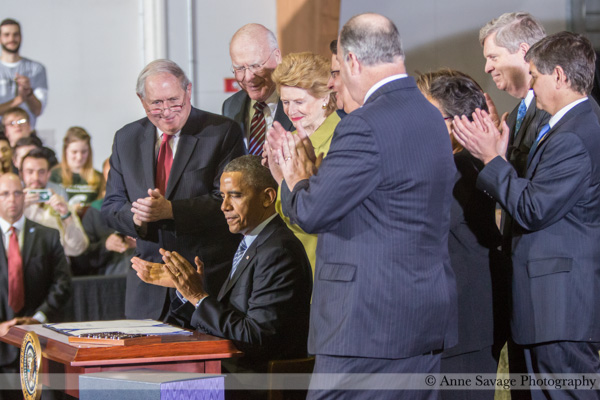
It’s a law!

Senator Debbie Stabenow beams after her bill is signed into law

Michigan Senators Carl Levin and Debbie Stabenow speak with U.S. Secretary of Agriculture Tom Vilsack

MSU Spartan basketball coach Tom Izzo

Congressman Gary Peters with the man whose seat he hopes to fill, Sen. Carl Levin
You can read the complete transcript of President Obama’s remarks at the signing HERE.



